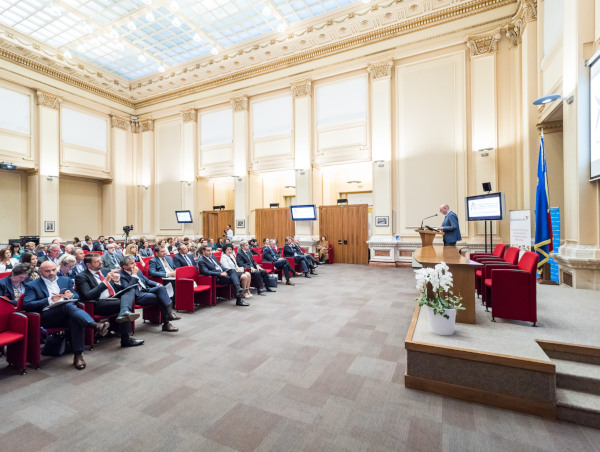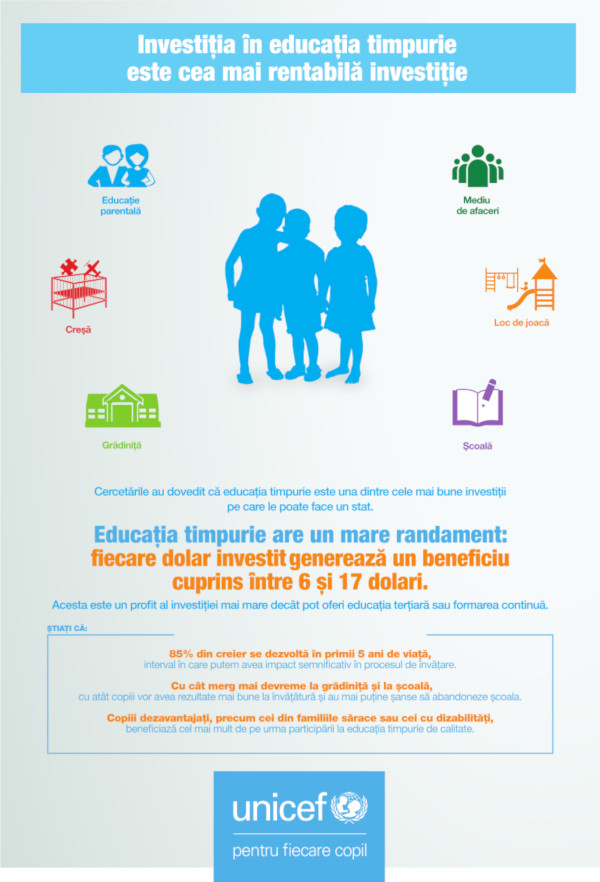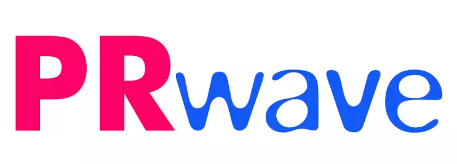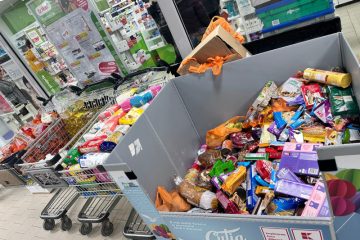Ministerul Educației Naționale, Asociația Centrul Step by Step pentru Educație și Dezvoltare Profesională, Aspen Institute România, ReadyNation România și UNICEF în România au organizat marți, 21 mai 2019, la sediul BNR, cea de-a patra ediție a conferinței „Primele 1000 de zile din următorii 100 de ani” pentru promovarea educației timpurii. Tema din acest an a conferinței a fost „Educația timpurie și profesioniștii viitorului”.
„Guvernul României salută orice inițiativă menită să sprijine dezvoltarea sistemului de educație timpurie. Prin Programul de Guvernare ne-am asumat să investim în domeniul învățământului și să luăm măsuri pentru ca toți copiii României să aibă acces la educație de la vârste mici și la condiții decente de viață. Așa cum bine punctează genericul conferinței din acest an, educația timpurie formează profesioniștii de mâine”, le-a transmis participanților la conferință Viorica Dăncilă, Prim-ministrul României, prin intermediul Consilierului de Stat Daniela Gabriela Coța.
Conferința a facilitat dialogul între decidenți instituționali, specialiști și reprezentanți ai mediului de afaceri pentru schimbul de bune practici și identificarea modalităților de promovare a investiției în educația timpurie, având în vedere necesitatea pregătirii tinerei generații în perspectiva provocărilor pe care le va ridica piața muncii pe termen scurt, mediu și lung.

“Copiii care merg acum la creșe și la grădinițe vor avea meserii încă neinventate, dar știm sigur că angajatorii caută profesioniști care știu să comunice, să lucreze în echipă, să rezolve conflicte, să se adapteze, să găsească soluții. Bazele tuturor acestor abilități se pun prin educație timpurie. De aceea, trebuie să investim strategic în educația timpurie și în îngrijirea copiilor și trebuie să comunicăm constant despre importanța primelor 1.000 de zile din viața copiilor”, a declarat Ionel Florian Lixandru, Secretar de Stat, Ministerul Educației Naționale.
“Conform studiilor internaționale și experiențelor practice din România, investiția în educația timpurie de calitate este o investiție strategică, cu rezultate extraordinare pe termen lung. În acest sens, parteneriatul dintre autorități centrale, județene și locale, mediul de afaceri și cel non-guvernamental, profesioniști și părinți, este esențial pentru a oferi fiecărui copil și, cu atât mai mult, copiilor vulnerabili șansa unui viitor mai bun. Abilitățile formate în copilăria timpurie sunt esențiale pentru reușita la școală și, mai târziu, pe piața forței de muncă”, a spus Pieter Bult, Reprezentantul UNICEF în România.
“Implicarea mediului de afaceri în promovarea educației timpurii este extrem de importantă întrucât prin resursele umane și materiale de care dispun, antreprenorii au puterea de a contribui la proiectele de modernizare a educației românești, astfel încât, peste ani, să ne mândrim împreună cu faptul că am susținut progresul României și am deschis noilor generații drumul către succes”, susţine Radu Enache, Președinte Board ReadyNation România.
Discuțiile au vizat găsirea acelor priorități comune care să ofere tuturor copiilor șanse egale pentru atingerea adevăratului lor potențial în societate.
“Importanța crucială a primelor 1000 de zile din viața copiilor este o certitudine ştiinţifică şi mă bucur că este înţeleasă de categorii tot mai vaste, dar mai ales de către factorii de decizie. E momentul să acționăm pentru a face tot posibilul ca generațiile care se nasc să beneficieze de cele mai bune șanse pentru viitor. Investiția în educația timpurie ne poate da siguranța că aceşti copii îşi vor atinge adevăratul potențial și vor avea abilitățile și competențele necesare pentru a cunoaște succesul în viaţa personală şi profesională”, a afirmat Carmen Lică, Director CEDP Step by Step.

Pentru a contribui la dezvoltarea politicilor publice în domeniul copilăriei timpurii și la îmbunătățirea cadrului de implementare a acestora la nivel național, județean și local, Ministerul Educației Naționale în parteneriat cu Asociația Centrul Step by Step pentru Educație și Dezvoltare Profesională și UNICEF în România implementează proiectul „România crește cu tine – Educația timpurie, o investiție în viitor”.
În cadrul acestui proiect, 22 de comunități din județele Bacău și Brașov și un sector din municipiul București vor beneficia de implicarea mai multor echipe de specialiști (din domeniul educației, al sănătății, al protecției sociale, ONG-uri, culte religioase, oameni de afaceri etc.) pentru a dezvolta strategii în domeniul copilăriei timpurii care să fie adaptate fiecărei comunități în parte.
„Educația timpurie a reprezentat un model de succes acolo unde a fost aplicat, producând cele mai mari beneficii economice și sociale în timp și având un rol cheie în pregătirea forței de muncă a viitorului. Investițiile în educație preșcolară, pe modelul aplicat în țările nordice, dezvoltă competențele copiilor la vârsta la care se formează cele mai multe structuri neuronale. Pentru a oferi copiilor accesul la educație inclusivă de calitate și pentru a dezvolta servicii de educație timpurie inovative, este nevoie de parteneriate între sectorul public și mediul de afaceri”, este de părere Mircea Geoană, Președintele Aspen Institute Romania.
UNICEF in Romania Representative’s Speech at the fourth International Conference on ECEC “The First 1000 Days for The Next 100 Years – Early Childhood Education and Professionals of the Future
21st of May 2019, Bucharest
Ladies and gentlemen,
I am honoured to be with you today at the opening of the fourth International Conference on early childhood education and care “The First 1000 Days for The Next 100 Years -Early Childhood Education and Professionals of the Future”. Your presence at this event shows that we all share a common understanding about the importance of the early years of life for our children, communities and society at large.
At global level, UNICEF has been advocating for making sure that all children have the right to quality inclusive education as stipulated in the Convention of the Rights of the Child and in line with the Sustainable Development Goals. This is why UNICEF is strongly committed to the global campaign “Early Years Matters”, to which Romania contributes.
We all want our children to develop to their full potential as this represents a key opportunity and prerequisite for a prosperous and harmonious society. With the ratification of the UN Convention on the Rights of the Child, all countries shall strive to ensure that no child is deprived of his or her right to access essential services for early healthcare, including early preventive healthcare, nutrition and early education with a focus on the rights of children from disadvantaged backgrounds.
The 1,000 days between start of the pregnancy and a child’s 2nd birthday are the most critical days to positively influence the child’s cognitive and physical development.
Five things given to a child in their first 1,000 days of life can help determine their future:
1. Good health that will allow them to fight infections and grow
2. Nutrition that will feed the body and the brain
3. Responsive Care that will nurture emotional and cognitive development
4. Safety that will shield them from toxic stress and abuse
5. Early Learning and stimulation that will spark brain cell connections.
Early childhood education and care refers to any regulated arrangement that provides education and care for children from birth to compulsory primary school age. It includes centre and family-day care (both privately and publicly funded), pre-school (creches) and pre-primary provision (kindergartens).
Quality early childhood education and care lays the foundation for later success in life in terms of education, well-being, employability, and social integration, and is especially important for children from disadvantaged backgrounds. In addition, early education is one of the best investments a country can make as the return of investment is a much higher than what university education or continuous training can offer.
As parents are the persons being mostly responsible for a child’s health, well-being and development, they do need adequate support. Parent’s social inclusion, labour market participation, and access to services and social protection are very important. Parents need to be well informed, supported and guided. In this context, outreach and demand creation activities are crucial.
The availability, accessibility and affordability of quality early childhood education and care services makes it easier for parents to combine their professional and caring responsibilities, enabling them to stay in, or return, to paid employment, which is in many ways of importance for the well-being and development of children.
Romania is increasingly recognizing the importance of early education and care. Especially at the level of pre-school education, the country has made significant progress. The general enrolment rate increased with 16% and new legislation was adopted on the financing of ante-preschool education and to the gradual inclusion of the pre-school education in compulsory education.
Despite these positive developments, much remains to be done, particularly in the first 1,000 days. Enrolment rates remain extremely low – in fact we don’t have data and the last figure dates from 2011 and says 2%. In addition, the high level of child poverty in Romania combined with a significant drop in community-based services, and the fact that parenting programmes, which have proven to be extremely successful in strengthening early education and care especially in vulnerable households, are not scaled up.
Significant disparities remain, such as in access and participation to early childhood education and care services and preschool education for Roma children, children with disabilities, and children from rural areas. Discrimination persists, and I cannot stress enough the role of education for fighting stereotypes and promoting diversity.
Practices that deepen the partnership between parents and early childhood education and care services have a particularly positive impact for children from disadvantaged backgrounds. The combination of universal policies promoting the well-being and development of all children and targeted policies directed at, but not stigmatizing, the most vulnerable families is a key. Affordable (or free) integrated community services, which may include mobile services, home visits, parenting and family counselling programmes, combined with demand creation and empowerment of disadvantaged groups, could contribute, not only to the inclusion in early childhood education and care, but to the general improvement of family care and child well-being and development.
Where it concerns children with disabilities or with special needs, early intervention and supporting parents through home-based and community-based services is even more critical. Children with disabilities may not only experience problems in relation to not being included in the educational system but also in relation to access to the physical environment, as well as prejudice and stereotypes. Without timely and appropriate support, protection and measures to promote inclusion, these difficulties can become even more severe and trigger lifetime consequences in terms of increased poverty and exclusion for both parents and children.
The recent joint initiative between Step-by-Step Foundation and UNICEF implemented in Bacau and Brasov, called “Romania grows with you”, will increase the participation to early childhood education and care services of vulnerable children from poor communities, Roma, rural and children with disabilities, with the aim to offer crèches and kindergartens as welcoming environments for all children.
Seeing the world through the eyes of the young child and thinking about the city/community from the perspective of a child will help us create child friendly communities for each and every citizen. A child friendly city should have child friendly creches, kindergartens, schools, child friendly health services, child friendly social protection and child protection services, child friendly urbanism and architecture etc.
Romania should increase the investment in early education to the level of other EU member states. Such additional investment should aim at two clear objectives: firstly: to increase the participation to early education of vulnerable children from poor communities, Roma, rural and children with disabilities, and secondly: improve the quality of education.
Early education should be of high quality – teachers should receive better training to translate the principles of modern education and the new curriculum into a quality pedagogical practice. We need well trained teachers also in creches, not only in kindergartens.
I particularly welcome representatives of the Romanian business community to the conference. Collaboration between public and private sector is not only a strong mutual driver for early childhood education and care, but also critical in finding innovative and sustainable solutions in early education.
Lastly, I would like to give special thanks to our partners from the National Bank of Romania for hosting this event for the second year in a raw. What other better sign that early education should be considered as a strategic investment?
I’m sure that if we join the efforts and renew our commitment for the smart investment in early years, this will generate positive results for all children in Romania and will create nurturing and caring environments, transform communities in child friendly ones, and laying the foundations for inclusive development and social and economic prosperity for many generations to come.
Thank you.
Foto @UNICEF Adrian Holerga



